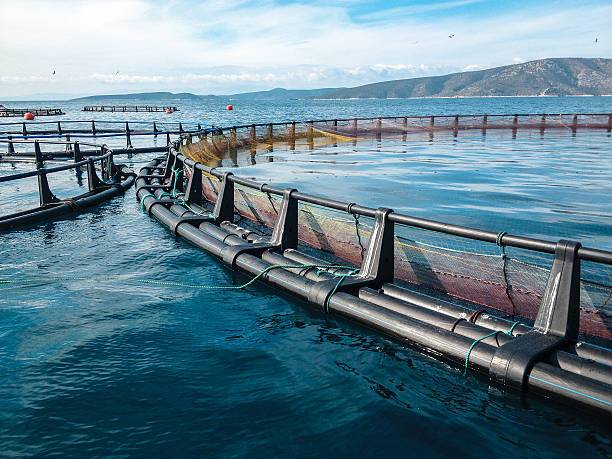In the face of soaring global demand for seafood, diminishing wild fish stocks, and the urgent need for sustainable food production practices, aquaculture has emerged as a beacon of hope and innovation. This sector, also known as fish farming, involves the breeding, rearing, and harvesting of fish, shellfish, algae, and other organisms in all types of water environments. As the fastest-growing food sector, aquaculture has not only provided a substantial answer to the global food security question but also introduced new economic opportunities across the globe. This article delves into the industry’s current landscape, highlighting the top 10 largest aquaculture companies that are leading the charge in sustainable seafood production.
The Rising Tide of Aquaculture
The global aquaculture market has witnessed unprecedented growth over the past few decades, driven by increasing consumer awareness of the health benefits associated with seafood consumption, advancements in aquaculture technologies, and a growing emphasis on sustainable practices. According to the Food and Agriculture Organization (FAO), aquaculture production has expanded from representing just a fraction of global seafood supply in the 1970s to surpassing wild fisheries as the main source of seafood for human consumption.
This remarkable growth trajectory is not without its challenges, including environmental concerns, the need for sustainable feed sources, disease management, and regulatory hurdles. Despite these obstacles, the industry’s leaders have continually innovated, adopting more sustainable practices and technologies to ensure the long-term viability of aquaculture.
The Giants of Aquaculture
The global landscape of aquaculture is dotted with companies that have not only grown in size but have also been instrumental in pushing the frontiers of technology, sustainability, and best practices. Here are the world’s top 10 largest aquaculture companies, known for their significant contributions to the industry:
1. Marine Harvest (Mowi ASA)
Headquarters: Bergen, Norway
Key Products: Salmon
Mowi ASA, formerly known as Marine Harvest, is the world’s largest salmon farming company. With operations in Norway, Scotland, Canada, Chile, Ireland, and the Faroe Islands, Mowi is recognized for its commitment to sustainability and innovation in salmon aquaculture.
2. SalMar ASA
Headquarters: Frøya, Norway
Key Products: Atlantic Salmon
A global leader in salmon farming, SalMar stands out for its offshore aquaculture operations, which aim to mitigate environmental impact and improve fish welfare.
3. Lerøy Seafood Group
Headquarters: Bergen, Norway
Key Products: Salmon, Trout, Whitefish
Lerøy is one of the world’s leading seafood corporations, with a history dating back to 1899. The company’s integrated value chain ensures high-quality, sustainable seafood production.
4. Cooke Aquaculture
Headquarters: New Brunswick, Canada
Key Products: Salmon, Trout, other Seafoods
A family-owned company, Cooke Aquaculture is a global seafood leader, emphasizing sustainable and responsible aquaculture practices across its operations.
5. Cermaq Group AS
Headquarters: Oslo, Norway
Key Products: Salmon, Trout
Owned by Mitsubishi Corporation, Cermaq is a pioneer in sustainable aquaculture, focusing on research and development to improve fish health and welfare.
6. Nireus Aquaculture S.A.
Headquarters: Koropi, Greece
Key Products: Sea Bream, Sea Bass
Nireus boasts a reputation for quality and innovation in the Mediterranean aquaculture industry, with a strong focus on sustainable and environmentally friendly practices.
7. Thai Union Group PCL
Headquarters: Bangkok, Thailand
Key Products: Shrimp, other Seafood
Primarily known for its canned tuna products, Thai Union has expanded its aquaculture operations, emphasizing sustainability and ethical practices in shrimp farming.
8. Dalian Zhangzidao Fishery Group
Headquarters: Dalian, China
Key Products: Scallops, Sea Cucumber, Abalone
This company is a major player in the Chinese aquaculture sector, known for its large-scale, diversified aquaculture operations focusing on shellfish and sea cucumbers.
9. Tassal Group Limited
Headquarters: Tasmania, Australia
Key Products: Salmon
Tassal is Australia’s largest salmon producer, committed to environmental stewardship and sustainable aquaculture practices.
10. Bakkafrost
Headquarters: Glyvrar, Faroe Islands
Key Products: Salmon
As the leading producer of salmon from the Faroe Islands, Bakkafrost is dedicated to maintaining high standards of fish welfare and environmental care.
The Future Wave of Aquaculture
The future of the aquaculture industry lies in its ability to adapt to the changing global landscape, embracing sustainability, technological innovation, and responsible management practices. The companies listed above represent the vanguard of an industry at the cusp of transformation, leading the way towards more sustainable and efficient aquaculture practices.
Sustainability at the Forefront
Sustainability has become a non-negotiable aspect of aquaculture, with consumers increasingly demanding ethically sourced and environmentally friendly seafood. The industry’s leaders are responding by adopting practices that reduce environmental impact, such as developing alternative, sustainable feed sources, implementing energy-efficient farming technologies, and enhancing fish health and welfare standards.
Technological Innovations
Technological advancements play a crucial role in the evolution of aquaculture. Innovations in genetics, disease management, feed efficiency, and farming systems are making it possible to increase production while minimizing environmental footprint. Companies are also leveraging data analytics, AI, and IoT solutions to optimize operations and improve sustainability.
The Path Forward
As global seafood demand continues to rise, the aquaculture industry’s role in ensuring food security and economic development becomes increasingly vital. The top aquaculture companies, with their commitment to sustainability, innovation, and best practices, are not just leading the industry; they are shaping the future of global food production.
In conclusion, the aquaculture industry, driven by the efforts of its leading companies, stands at the forefront of addressing some of the most pressing challenges of our time, including food security, environmental sustainability, and economic development. As we navigate the waters of global food production, the aquaculture sector, with its giants leading the way, offers a promising and sustainable path forward.
Related: Global Aquaculture Industry Report
